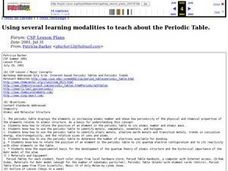Curated OER
Balancing Chemical Equations
Ninth graders explain how atoms and molecules form different substances during chemical reactions and how these processes require losing, gaining or sharing electrons. They correctly write chemical formulas and show how a balanced...
Curated OER
Chemistry 1A Review
In this Chemistry 1A worksheet, students review, molecular weight, solubility, endothermic reactions, and number of protons, neutrons, and electrons for elements. Students review Lewis Structures and how to predict the amount of product...
Curated OER
Molecular Models Laboratory
Students use models to visualize molecular structures. Students read about Lewis dot structures, hybridization, and formal charge. Then students build and draw the molecules and ions given. Students complete 11 pre-lab questions and 4...
Curated OER
Some Basic Chemical Ideas
In this chemistry activity, students fill in the blanks with the correct word from the word list. They examine the arrangement of elements in the periodic table.
Curated OER
Molecular Structures or Visualizing Molecules
Learners identify and describe the molecular structure using the terms of Valance Shell Electron Pair Repulsion. Students predict simply molecular structure in various forms, as well as predict bond structure between atoms of a molecule....
Curated OER
Cellular Respiration and Photosynthesis
For this cellular respiration and photosynthesis worksheet, students read through the presented material and draw an illustration of the production of ATP. Students answer several short answer questions about the production of ATP,...
Curated OER
How is the Strength of an Acid Determined?
Students study acids and how they can be measured. In this acid lesson students distinguish the properties that create strong and weak electrolytes.
Curated OER
Chemical Formulas Unit-Day 4
The purpose of this instructional activity involves reviewing nomenclature and molecular
formulas as well as introducing naming molecular compounds and identifying acids. The students investigate and understand how conservation of...
Curated OER
Using several learning modalities to teach about the Periodic Table.
Students identify how to relate the position of an element in the periodic table to its atomic number and atomic mass. They identify how to use the periodic table to identify metals, semimetals, nonmetals, and halogens, and also,...
Curated OER
Dog Aggression
In this trivia quiz, the information focuses on dog aggression. Students respond to 10 multiple choice questions and submit answers electronically via this interactive website.
Virginia Department of Education
Properties of Compounds and Chemical Formulas
Young chemists have unknown compounds they need to sort. Performing three different tests on each, the chemical behaviors they observe become the basis for data analysis.
Virginia Department of Education
Mystery Iron Ions
Young chemists perform an experiment to determine if a compound is iron (II) chloride or iron (III) chloride. Then they determine the formula, balance the equation, and answer analysis questions.
Normal Community High School
Golf Ball Lab
The first golf balls were made of wood and would only last for a few games. Modern golf balls last a lot longer but they don't float. The presentation provides the directions for a lab to determine the minimum amount of salt needed to...
Curated OER
Drops on a Penny
A helpful instructional activity describes an interesting demonstration on the surface tension of water. Learners guess how many drops of water the heads side of a penny will hold. This resource does a great job of describing just how a...
Curated OER
The Influence of Initiator Concentration on the Molecular Weight of Polystyrene
This in-depth organic chemistry lab walks learners through an investigation of the effect of initiator concentration on the resulting molecular weight of polystyrene. It is important that you use this lesson with experienced chemistry...
Curated OER
Finding Oxidation States
In this chemistry worksheet, students examine the oxidation state in order to apply it in the laboratory setting. The sheet includes in depth background information.
Science Geek
Periodic Trends
If your pupils think Um is the element of confusion, this presentation on period trends can only help. It covers the patterns for atomic radii, ionization energy, and electronegativity across a period and down a group.
Curated OER
Student Reading - The Unique Properties of Water
Without water there would be no life on this planet. Biology learners find out why by reading this handout. Create a worksheet of questions to answer after the reading. Follow it up with quick demonstrations or laboratory activities that...
Curated OER
The Nature of Salt
Young scholars record information from the periodic table for sodium and chloride. They determine whether salts are molecular or ionic compounds, along with sodium chloride's molecular weight, and relative weights
National Energy Education Development Project
The Science of Energy
Did you know the word energy comes from energeia, a Greek word? Introduce learners to the four types of potential energy, five types of kinetic energy, and energy transformation with a presentation about where we get our energy and...
Biology Junction
Water Properties and More
Did you know many insects use cohesion or surface tension to walk on water? Using a presentation, scholars learn the more important properties of water. It extends into the concepts of solutions, suspensions, pH, and more.
Pingry School
Comparing Activities of Selected Metals
Don't overreact! A simple experiment demonstrates chemical reactions as scholars mix chemical solutions and metals in a large well plate. They note all changes to the metals, solutions, precipitate, colors, and more. A full data table...
Cornell University
Bacteria Take Over and Down
Bacteria outnumber all other forms of life on Earth. Scholars observe the growth of bacteria in petri dishes to understand their role in maintaining good health. Then, they observe the growth of bacteria after they introduce...
Curated OER
Photosynthesis: Life from Light and Air
All aspects of the photosynthesis process, and the way that plants have adapted with specializations are detailed here. The diagrams and info-graphics will be useful to your AP biology class. It could also be used as a review...























